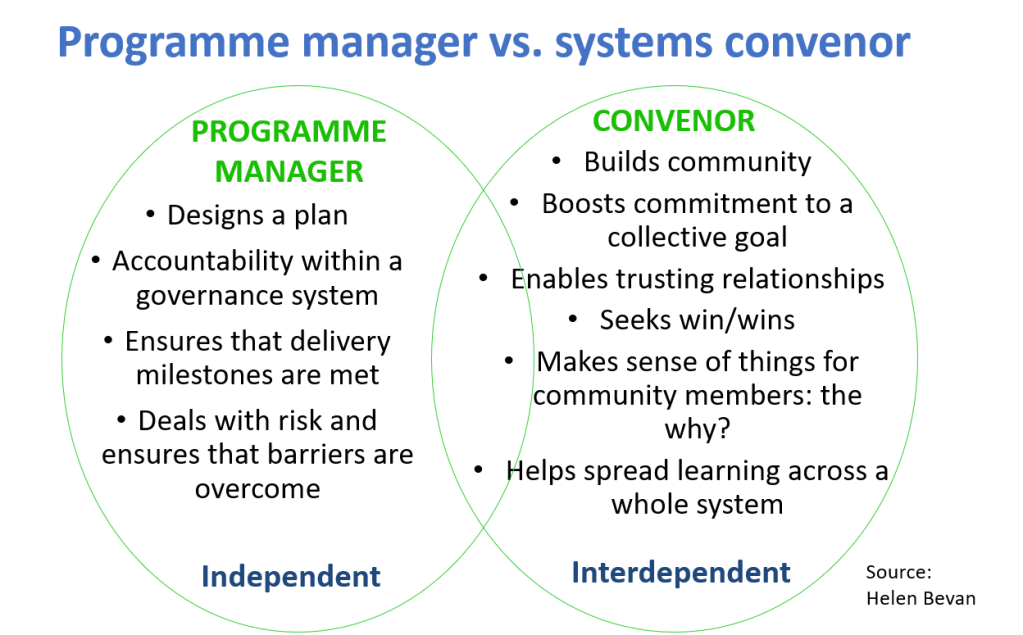Recently I’ve been thinking a lot about tension between moving fast and moving with purpose.
At Holland Bloorview we have lots of new programs we are trying to stand up. I often quote my friend and colleague Dr Tom Chau: “Today is the most important day in the life of a child.” Our sense of urgency derives from knowing how much children, youth and families need more of what we do well and expansion into new areas. How can we delay what we know they needed yesterday?
As a leader, I toggle between feeling like we can’t move fast enough and feeling like we have to slow down for fear of not doing things the right way for the right reasons. As she often does, Helen Bevan posted a graphic that captured the leadership opportunity really well:

The program manager mindset will help us hit delivery milestones efficiently. The convenor mindset will ensure that we express our values through the way we advance change. Each leadership orientation and supporting leaders to embrace both perspectives is critical.
Here’s a concrete example. A few months ago we received funding for a new integrated program for children with a combination of extensive unmet behavioural, medical and social needs (developed with colleagues at CHEO and McMaster Children’s Hospital). Our new strategic plan Transformative Care, Inclusive World: Holland Bloorview 2030 includes a commitment to inclusion, diversity, equity, accessibility and anti-racism. Constrained by the “crisis” in health human resources, under pressure to evaluate and demonstrate results and with family need being so urgent, the extensive needs team and leadership is building as fast as they can (“manager”). Simultaneously, they are also focusing on partnership and building community beyond our organizational walls and across the region. Because this program is doing a burst of hiring, we can’t waste the strategic opportunity to invest in recruitment practices and professional practice support to lead us towards being more diverse and representative of the communities we serve and ensuring that staff belonging to equity seeking groups experience psychological safety, engagement and belonging (“convenor”).
This focus on the ”how” of the work is also critical to achieving our new strategy’s very first goal: healthy team. For example, in developing or expanding the program, the local team who will be providing the service needs to be given the time and tools to engage in co-design (another of our strategic commitments).
None of this is possible without psychological safety: the belief that it is safe to take interpersonal risks, such as speaking up, asking questions, expressing concerns and bringing your whole self to work. However, psychological safety is often lacking in healthcare settings, where team members may fear negative consequences for voicing their opinions or admitting their mistakes.
One of the factors that can undermine psychological safety in healthcare teams is the scarcity mindset, a fear of punishment for even asking for adequate funding let alone overspending. A scarcity mindset can also limit team members’ ability to learn, grow, and innovate, as they may avoid taking risks or exploring new possibilities.
No one can be blamed for having a scarcity mindset because that’s been the overwhelming experience of working in healthcare for decades! That’s why we need to think carefully about how we expend new funding to make sure we cultivate what is sometimes called a prosperity mindset: the confidence to use resources to make the best decisions for quality design and provision of services. This can be as simple as investing in much needed project management or administrative support for a team taking on additional activities or investing in areas such as communications, finance or people and culture who need to support new direct care. A prosperity mindset can promote collaboration, trust, support, and long-term thinking and also enhance team members’ ability to learn, grow, and innovate, while embracing challenges and opportunities with curiosity and optimism. These are all contributors to a healthy team.
Successful leaders of an abundance mindset and psychological safety will demonstrate a consultative and supportive style, seek feedback, listen actively, and empower others to lead and learn. This is a courageous and generative leadership! For example, together we need to:
- ask open-ended questions, acknowledge different perspectives and delegate tasks and responsibilities to team members based on their strengths and interests
- celebrate successes and learn from failures and mistakes
- be involved in decision-making processes and be empowered to take ownership of work and actions
- engage children, youth and families is authentic co-design
- be provided with opportunities for learning and development, and supported in pursuing personal and professional goals, and
- foster a culture of continuous improvement and innovation, and experiment with new approaches and solutions.
None of this is easy but it is exciting and fun! And it’s the only road to a healthy team and transformative care – agile, socially accountable and transformed by research and education.
___
Julia
@Hanigsberg

